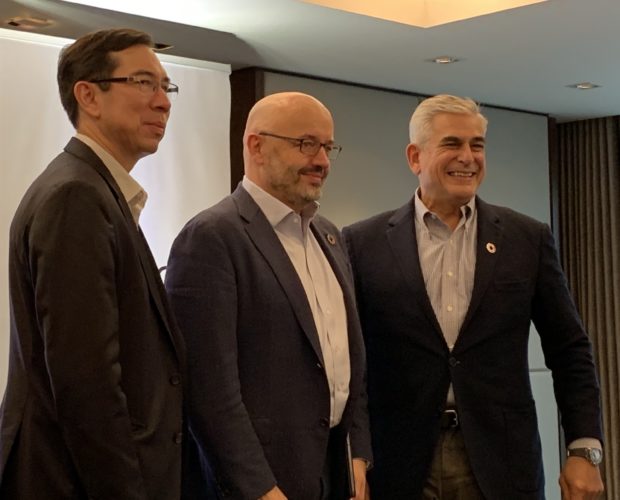Ayala group sets sustainability blueprint

Ayala Corp. chief financial and sustainability officer Teodoro Limcaoco, World Business Council for Sustainable Development president Peter Bakker, Ayala Corp. chair and CEO Jaime Augusto Zobel de Ayala
The country’s oldest business house, Ayala Corp., is ramping up efforts to integrate sustainability into its business agenda and cascade the same consciousness not just to its own operating units but to the entire ecosystem of small and medium-sized enterprises (SMEs) that form its supply chain.
Speaking at the company’s first integrated corporate governance, risk management and sustainability summit, Ayala Corp. chair and CEO Jaime Augusto Zobel de Ayala said the group had designed a long-term sustainability blueprint that mapped out actionable and measurable targets that would address critical environmental, social and governance gaps.
“We identified marginalization, large untapped potential of our human capital and irresponsible growth leading to long-term environmental damage as the three critical challenges our group can focus on,” Zobel said.
“Under the blueprint, we will focus on contributing to the achievement of three pillars where we believe our businesses can generate the most significant and lasting impact. These are access and inclusivity, productivity and competitiveness, and responsible growth and innovation,” he added.
Teodoro Limcaoco, Ayala chief financial and sustainability officer, said in a briefing that “long-term value can only be built up by companies that subscribe to sustainable strategy.” He noted that while Ayala alone could not address all the 17 sustainable development goals mapped out by the United Nations, it had committed to focus on these three areas.
Zobel said the group would also strive to cascade the paradigm by helping to educate the SMEs that make up its ecosystem with these imperatives.
“The disconnect we’ve seen in the past of trying to do good for the world and trying to do good for the shareholders no longer exists. If you look at the interconnectedness of issues that we all face, whether it’s climate change or stress from nature or inequality in societies, we can no longer differentiate those from the financial success that any individual company or even GDP (gross domestic product) as a measure of country’s success can be portrayed,” Peter Bakker, president of the World Business Council for Sustainable Development (WBCSD), said in a briefing.
Ayala is the first Philippine company to be a member of WBCSD, which brings together 200 of the world’s leading firms to work on “big transformations” around sustainable development.
“We need to move the energy system as quickly as we can the latest by 2040 to zero carbon. We need to move to a circular economy in terms of the resources we use and the waste we produce. We need to completely revolutionize the food system to feed 10 billion people with healthy diets within the boundaries that the climate will set us. We need to change the ways we think about buildings, mobility and cities,” said Bakker, a keynote speaker at the summit.
“We need to think about the future of work, because as technology evolves, jobs will disappear and new jobs will be created but how do we transition people into them? Eventually we need to think about what’s the role of the economic system in which companies operate,” he said.
